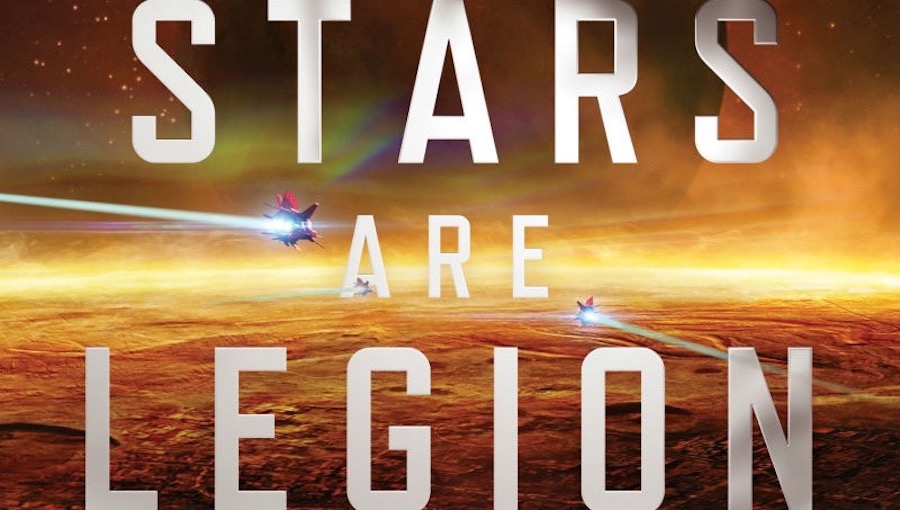“There is nothing I fear more than someone without memory. A person without memory is free to do anything she likes.” ~ Lord Mokshi, Annals of the Legion
The Stars Are Legion is a new release from Saga Press, written by Hugo Award-winning author Kameron Hurley, whose other novels include the God’s War trilogy, The Mirror Empire, and Empire Ascendant; the latter two titles are from the Worldbreaker Saga series. In this story, readers are transported to a decaying system of worlds s– monstrously huge ships to be accurate – located in the outer reaches of the universe. Sisters by oath, Jayd and Zan are propelled on separate journeys with the same end goal to save their worlds by creating a new one. Each face daunting challenges: Jayd is a bargaining chip in a peace treaty so that Zan can try to successfully enter an elusive world that is the key to bringing about the end of political unrest, war, and division amongst the various worlds.
Hurley’s story is reminiscent of the films Journey to the Center of the Earth (1959, Henry Levin), Memento (2000, Christopher Nolan), and Groundhog Day (1993, Harold Ramis), all blended together. Taking the core concept of each film – the cavernous world of unusual peoples and animals, a person who suffers a rare form of memory loss, and a person living one day over and over again – and folding them into a science-fiction world is actually very effective. In the opening pages, readers share Zan’s disadvantaged position of being in an unfamiliar surrounding with scant memories. With this displacement, Hurley explores value, placement, and expectations of one’s self at a personal level balanced with a foreign society at large. Like Zan, readers must grapple with the same blank slate that Zan does due to her lack of memory. Hurley alternates between Zan and Jayd’s perspectives. One would figure that Jayd, who is Zan’s anchor in the initial chapters, would provide readers with the missing context and experience; however, Jayd is mysterious and holds the truth very close to her chest. It’s a situation that Hurley plays off well and keeps the reader engaged in the unfolding story, anxious to discover what world-changing plan had been agreed upon by Jayd and Zan.
Although the overarching story is intertwined between a shared plan between Zan and Jayd, they spend much of their time in the novel traversing along separate paths from each other. Recycled to bowels of Katazyrna, Zan must fight her way back to the surface of the world. Along the way she meets three women who become integral to her survival and ultimate goal. Initially, suspect of each woman’s motives, Zan eventually realizes the importance of these relationships and the love and respect that grows into a familial dynamic. Jayd’s motivation is freedom from the suffocating subservience to her mother, which dips Jayd’s intentions into the realm of revenge. Yet, for all of the apparent selfish decisions she makes that hurt a great many people, she sacrifices the deep-felt love she has for Zan for a greater good. The main characters are well developed and are especially enriched by hte inclusion of fascinating secondary characters such as Das Muni, Casamir, and Arakadash. Each seems to have their own hero’s journey to experience.
The underworlds of Katazyrna are particularly captivating, sparking the comparison to Journey to the Center of the Earth. Descriptions of locales tantalize the imagination and the fragmented details of the monsters hearkens to the Lovecraftian technique to draw the curtain back only so far in order to heighten the sense of tension of the unseen terror. Pacing is brisk, especially after Zan and Jayd become separated. Critical to the reading enjoyment, Hurley does not limit the exploration of themes – love, war, duty, value – for the sake of the narrative’s beats.
In the acknowledgements, Hurley describes her story as a “space opera,” and that is an apropos description. With provocative characters and riveting action, for readers who enjoy science fiction adventure-thrillers, this is an epic story not to be missed. Additionally, The Stars Are Legion has been compared to Frank Herbert’s Dune and Dan Simmons’ The Fall of Hyperion, which is a fair assessment of Hurley’s placement amongst long-established authors in the genre. She will not disappoint.

